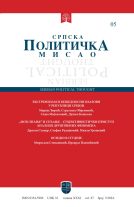- Home page
- Researchers
- Milica Bošković
Milica Bošković
Faculty of Diplomacy and Security

I-DOSING – DIGITAL DRUG?
In 1839, Heinrich Wilhelm Dove discovered that two constant tones, emitted at slightly different frequencies at each ear, conjured the listener to register this as a fast rhythm, and this phenomenon was called binaural beats. Among the authors today, there are conflicting opinions about whether this phenomenon can be "abused". Binaural beats are brainwave entertainment technology, designed to put the brain into the same activity level as when meditating using traditional methods. Binaural beats affect mood, concentration and sleep by modifying brain waves based on the brain's response patterns to dichotomous and different frequencies. Therapy by music, as well as the use of certain specially arranged sounds to relieve anxiety, stress or health problems such as high blood pressure, are not unknown and are even widely accepted and used in different branches of medicine. However, when scientists, and companies in particular, point out that binaural beats, used in a certain way, can affect the state of consciousness and behaviour, referring to the feelings created by drug use, then it raises serious questions. Digital drugs or binaural beats that support the creation of a feeling similar to that of drug abuse, is a phenomenon about which less is known, Considering that, especially the young population, is already being treated today. Medical treatments have been created to get rid of addiction to the Internet, smartphones and similar technologies, it is clear that any innovation, like medicine, can also have the possibility of abuse. Bearing this in mind, binaural tones created and used to intentionally influence the mood and flow of thoughts (not part of medical treatment under professional supervision) can and must be viewed as a security threat in socio-pathological phenomena.

THE IMPORTANCE OF SC UN RESOLUTION 1325 FOR IMPROVING THE STATE OF HUMAN SECURITY
The challenges societies and countries are facing both at the national and global level at modern times, show, more than ever, the significant impact for the implementation of the concept of human security. Poverty, unequal access to education and employment, violation of human rights and settlement among people and social groups, destabilize states, and therefore the pillars of national security. Discrimination and violence against one large group in society - women, on a global level has shown that such conditions at society and actual norms cannot lead to stability and a conflict-free future. A society that has weak response mechanisms to violence against women, their discrimination at economic terms, and at the chances to find themselves in key positions in political and security structures, basically cannot understand the concept of well-being, peace, and progress. UN Security Council Resolution 1325 and action plans for its implementation at the national and local level make a significant contribution for overcoming these entrenched stereotypes and today's security challenges. This Article presents the results of the implementation of national action plans at our country, which resulted from Resolution 1325, better known as “Women, peace and security”. Thanks to the various analyzes of governmental and non-governmental institutions, it is possible to review the successes made so far, but also provided base for recommendations for further strengthening the mechanisms for achieving gender equality and improving human security in our country. At this Article, such recommendations are provided, based on previously shown data and descriptive explanations about improvements and gaps at our country.
